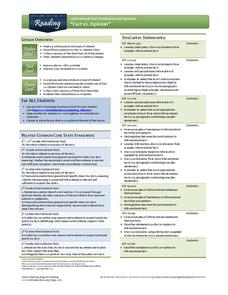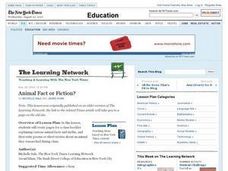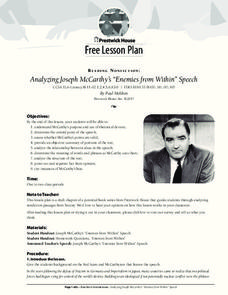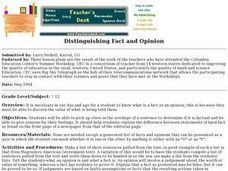For the Teachers
Fact vs. Opinion
Many informational texts are written as factual, but can your learners determine when an opinion is presented as fact? Have your kids read several articles on the same topic and record the statements that contain either facts or...
Florida Center for Reading Research
Comprehension: Text Analysis, Fact or Opinion Football
Touchdown! Try out this game to help your learners differentiate between fact and opinion. In pairs, pupils switch off reading cards to one another. Learners determine if the sentences on the cards are facts or opinions and continue...
Florida Center for Reading Research
Fact Versus Opinion
Is that a fact or an opinion? Learners explore the difference using this pocket chart activity during which partners read statement cards and determine whether they are facts or opinions.
Curated OER
Fact vs. Opinion (Part II)
How can you tell the difference between fact and opinion? Using newspapers, learners determine which articles contain statements of fact, and which articles reflect the writer's opinion. The lesson plan includes a discussion format and a...
Curated OER
Facts vs. Opinion (Part 1)
Provide pairs of learners with a three-page Fact vs. Opinion packet. The first page of the packet provides a definition of these terms and an opportunity for guided practice. Partners then share their ideas to complete the practice...
Curated OER
Fact and Opinion Lesson Plan
How are fact and opinion different? Middle schoolers explore fact and opinion and write articles pertaining to a football match, eliminating all opinion statements in order to focus on the facts. Then they discuss bias in the media....
Curated OER
Animal Fact or Fiction?
Read and discuss the article "Welcome to Cicadaville (Enter at Your Own Risk)" to gain a better understanding around the confusion regarding cicadas and locust swarms. In groups your young analysts research statements about animals to...
Curated OER
Is That a Fact?
Investigate popular scientific claims and gather evidence to defend or argue against an author's stance. Writers synthesize information and compose their own "Really?" columns modeled after those found in the weekly "Science Times"...
DePaul University
Seasons on the Prairie
Fact and opinion passages inform readers about the seasons on the prairie and Zambia in Southern Africa. Then, test scholar's knowledge with multiple choice and short answer questions.
Ed Worksheets
Read the Story
Want to boost your readers' comprehension skills and strategies? Look to these five pages, each with a short story and questions to answer covering main idea, facts, sequence of events, context clues, conclusions, and making...
Curated OER
Fact V. Opinion
Students use statements out of newpapers to distinguish between facts and opinions. They discuss these differences as well.
Curated OER
Fighting Fake News
Fake news. Alternative facts. Internet trolls. In an age of Newspeak, it's increasingly important to equip 21st century learners with the skills needed to determine the legitimacy of claims put forth on social media, in print, and in...
Curated OER
A Way with Words
How do facts and opinions impact the news? After reading "How to Cover a War" from the New York Times, middle schoolers evaluate the claims in the article. They also consider the media's responsibilities in reporting during wartime....
Scholastic
Consider the Source
Who is more trustworthy when it comes to marijuana: a high school student, or The National Institute on Drug Abuse? Sources matter when reading informational text. Help teenagers discern which facts are true with an activity that focuses...
Curated OER
Fact or Fantasy?
Are we alone in the universe? This brief informational text on extraterrestrial theory has been split into seven sections to help scholars practice note taking. They read the statements, underlining key words. Then, using the graphic...
Prestwick House
Reading Nonfiction: Analyzing Joseph McCarthy's "Enemies from Within" Speech
Looking for a lesson that teaches class members how to analyze nonfiction? Use Joseph McCarthy's famous "Enemies from Within" speech as a instructional text. Worksheet questions direct readers' attention to the many historical...
Curated OER
Fact V. Opinion
Students distinguish between fact and opinion when reading material. They use statements of objects to determine if they are facts or opinions.
Curated OER
Just the Facts, Jack
Third graders listen to music and discuss their responses to different styles separating their comments into facts and opinions. They evaluate a worksheet of statements by classifying the statements into fact and opinion.
Curated OER
Distinguishing Fact and Opinion
Students pick up clues in the wordage of a sentence to determine if it is factual and give reasons for their feelings. They explain difference between statements of hard fact as found on the front page of a newspaper from that of an...
Curated OER
Fact and Opinion Detectives
Third graders see how to distinguish facts from opinions in a child's news magazine. After a lecture/demo, 3rd graders utilize a sample story and a worksheet which gives them practice in distinguishing fact from opinion.
Curated OER
Creature Feature Poetry Keyword Search!
Students examine the differences between fact and opinion, and brainstorm ideas for a keyword list by analyzing facts. They listen to poems, and create posters listing three keywords about each creature featured in the poetry.
Curated OER
Reading Comprehension
After listening to a story learners engage in a kinesthetic activity to answer comprehension and critical thinking questions. Finally, the students identify three main facts about the story. Extensions include a fact and opinion...
Curated OER
Rudyard Kipling's "Rikki-Tikki-Tavi": Mixing Fact and Fiction
"Rikki-Tikki-Tavi," from The Jungle Book, offers young readers a chance to examine how Rudyard Kipling uses setting and personification to bring to life the brave mongoose who battles cobras to protect his family. Class members...
Curated OER
Determining Author's Point of View: The Sneeches
Determine the author's point of view in a text. Young readers read Dr. Seuss' The Sneeches and identify the author's purpose in the story. They identify persuasive techniques in writing, asking and answering questions to better...























